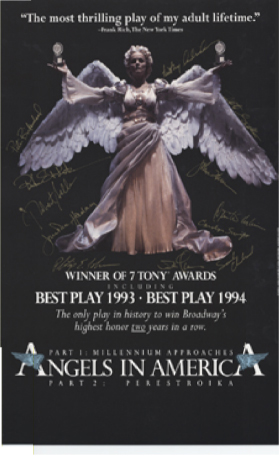Difference between revisions of "World Theater"
m (Protected "World Theater" [edit=sysop:move=sysop]) |
|||
| (3 intermediate revisions by one other user not shown) | |||
| Line 6: | Line 6: | ||
Downtown St. Paul’s oldest surviving theater is best known as the broadcast headquarters of Garrison Keillor’s “A Prairie Home Companion,” but it is also an important site of recent queer history in the Grand Old City. Norm Coleman, then-mayor of St. Paul (who was also a then-democrat until 1996), was already unpopular with queer people in St. Paul. He refused to sign a joint proclamation with Minneapolis declaring “Gat Pride Day” in 1993, and continued to refuse a signature for the remainder of his time in office. | Downtown St. Paul’s oldest surviving theater is best known as the broadcast headquarters of Garrison Keillor’s “A Prairie Home Companion,” but it is also an important site of recent queer history in the Grand Old City. Norm Coleman, then-mayor of St. Paul (who was also a then-democrat until 1996), was already unpopular with queer people in St. Paul. He refused to sign a joint proclamation with Minneapolis declaring “Gat Pride Day” in 1993, and continued to refuse a signature for the remainder of his time in office. | ||
| + | {| {{prettytable}} | ||
| + | ! | ||
| + | ! | ||
| + | |- | ||
| + | | [[Image:Angmer.jpg]] <div style="text-align: center;"> | ||
| + | <small>'''Angels in America poster, signed by the cast in Minneapolis' State Theater. Courtesy of the [[Jean-Nickolaus Tretter Collection]].'''</small> | ||
| + | </div> | ||
| + | | He is the only mayor in St. Paul’s history to withhold this ceremonial gesture to the GLBT community since the Pride Committee began the practice in the 1970s. A year after the first upsetting refusal took place, Coleman again came under fire for withholding support to the local queer community. | ||
| − | |||
| + | At the time, downtown St. Paul was in the midst of an identity crisis. Strangled by the freeways, experiencing high office vacancy rates, and sorely lacking in entertainment-based attractions—the city’s core was losing retail stores, residents, and tax money. | ||
| − | + | ||
| + | The World Theater was one of few bright spots on the vacant streets, but it largely depended on City money to sponsor any given show. In the event of low attendance, St. Paul’s government would prevent the World from going bankrupt with financial assistance. The City had the power to approve and reject specific plays in this respect; the theater could not afford to host a play without government support. | ||
In 1994, the theater requested financial assistance for Angels in America, Tony Kushner’s moving work on religion, gay life, HIV/AIDS, and the human condition. The prospect of low attendance required $50,000 in City-funded insurance, as id did with other plays. Coleman’s administration once again withheld support—this time arguing a lack of funds—and the State Theater in Minneapolis acquired the play instead. | In 1994, the theater requested financial assistance for Angels in America, Tony Kushner’s moving work on religion, gay life, HIV/AIDS, and the human condition. The prospect of low attendance required $50,000 in City-funded insurance, as id did with other plays. Coleman’s administration once again withheld support—this time arguing a lack of funds—and the State Theater in Minneapolis acquired the play instead. | ||
| + | |} | ||
| + | |||
---- | ---- | ||
| + | |||
| + | |||
This page is under construction. -SVC | This page is under construction. -SVC | ||
Part of [[Minneapolis/St. Paul, MN: 100 Queer Places in Minnesota History, (1860-1969), (1969-2010)]] | Part of [[Minneapolis/St. Paul, MN: 100 Queer Places in Minnesota History, (1860-1969), (1969-2010)]] | ||
Latest revision as of 11:24, 1 May 2010
(Now the Fitzgerald Theater) Eastern Corner of Wabasha St. and Exchange St.
Downtown St. Paul’s oldest surviving theater is best known as the broadcast headquarters of Garrison Keillor’s “A Prairie Home Companion,” but it is also an important site of recent queer history in the Grand Old City. Norm Coleman, then-mayor of St. Paul (who was also a then-democrat until 1996), was already unpopular with queer people in St. Paul. He refused to sign a joint proclamation with Minneapolis declaring “Gat Pride Day” in 1993, and continued to refuse a signature for the remainder of his time in office.
 Angels in America poster, signed by the cast in Minneapolis' State Theater. Courtesy of the Jean-Nickolaus Tretter Collection. |
He is the only mayor in St. Paul’s history to withhold this ceremonial gesture to the GLBT community since the Pride Committee began the practice in the 1970s. A year after the first upsetting refusal took place, Coleman again came under fire for withholding support to the local queer community.
|
This page is under construction. -SVC
Part of Minneapolis/St. Paul, MN: 100 Queer Places in Minnesota History, (1860-1969), (1969-2010)